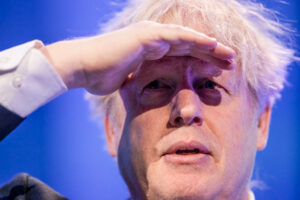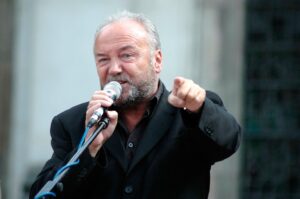“There are too many bloomin’ blacks,” the florist, perched behind her stall on Rochdale’s high street, says without a hint of shame. Her friend interjects: “They sit around here drinking and doing drugs… There are no police about. We need someone firm to fix it — someone like Trump.”
Who is that someone? Who will Make Rochdale Great Again?
Since storming to victory in February’s by-election, George Galloway has vowed to tackle Labour’s “corruption”, restore a maternity ward to the local hospital, and, as part of his “lasting legacy”, coax Primark to open a new store in the town. With the help of a Grand Alliance between his hard-Left Workers Party and other local candidates, he has also pledged to destroy Rochdale’s Labour Party in Thursday’s local elections.
One man hoping he’ll succeed is Billy Howarth. The flat-capped, plain-talking local attacked Galloway as “divisive” while running against him as an independent in Rochdale’s by-election but is now standing as a candidate for the Workers Party. “I thought his election would be a stepping-stone for the international stuff [Israel-Gaza], but actually he’s gone totally the opposite way,” he says. “Yes, he’s still speaking about the international stuff, but he’s speaking about Rochdale, and what Rochdale needs and he’s willing to fight for it.”
Howarth’s life has been deeply scarred by Rochdale’s depredations. Growing up on the sprawling Kirkholt Estate, built in the Forties by German prisoners of war, he was groomed and abused by a local paedophile, George Crawford, from the age of eight. “He was an animal of a man,” Howarth says now. “He was notorious. Never got convicted of it, but he was supposed to have raped over 200 boys.”
Widespread sexual abuse is still taking place in Rochdale, Howarth tells me, but he believes he has at least had some measure of justice. In 2000, Crawford, by then in his 60s and nearly blind, was charged with the sexual abuse of 10 boys during the Seventies and Eighties. A year later, while the trial was still ongoing, his wife found his body slumped against their living room door. He had been beaten to death by a local man with an ornamental lamp. At the killer’s trial, the prosecution said Crawford’s murder had been motivated at least in part by reports of his abuse spreading through the local area.
“I wouldn’t join any mainstream party,” Howarth says. “I hold all three of them accountable for Rochdale’s children being abused. It’s the poverty; it’s a class thing. I don’t believe it’s racial. There’s white guys involved in this too. They target girls from children’s homes and girls from dysfunctional families. They’re easy targets.”
Out on the doorstep, he claims that people are warming to the Workers Party. “I don’t have Palestine conversations on the door. It’s not my field.” Instead, Howarth claims, voters care more about the poor quality of housing in the region. Few have forgotten the death four years ago of two-year-old Awaab Ishak, who suffered from respiratory problems caused by the mould growing throughout his parents’ housing association flat. The tragedy led news bulletins, but little was done to make Rochdale’s houses safer.
Walking through a predominantly Asian part of Rochdale — where Palestinian flags flutter from buildings and a newsagent displays an advert for Salaam Cola, the BDS-approved alternative to Coke — support for the Workers Party seems widespread. Posters in shop windows feature Galloway shaking hands with local candidate Minaam Ellahi, a clean-cut young man who hopes to unseat the “pro-genocide Labour Party”. Standing on a nearby street, Muhammed, a bearded young man, tells me how Galloway won him over. “He’s trying to get a Primark in the town, he’s working on the market. Primark is a big deal for the town. We need to give him time. What have Labour done for Rochdale? At least Galloway is trying.” Waiting in a barbers’ shop, another man tells me he voted for Galloway because of Palestine, but thinks he is doing a lot for the town too. “Keir has failed to help Gaza,” he says bluntly. “I would never vote Labour again. Most Muslim voters will vote for the Workers Party, not Labour.”
In Rochdale, this is significant. While the town itself is 19% Muslim, that figure rises to 31% for the parliamentary constituency. And crucially, support among the community, long taken for granted by Labour, is faltering amid the fall-out from the Israel-Gaza war, with just 60% of Muslim voters who backed the party in 2019 willing to do so at the next election. This recalibration, the Labour Muslim Network said, revealed a “crisis point” that could prove irreparable.
And yet, when I ask the barber about the Workers Party poster in his window, he shrugs. “Someone came in and asked me to put it up.” A few doors down the road, Amhed, a butcher, seems equally perplexed at the Workers Party poster in his window. “I’m not supporting Galloway,” he tells me. “I was a Tory voter last time. Tories support businesses. They helped us during Covid.”
He is, however, the exception. Walking around the town, most Muslim voters praise Galloway’s character, while many non-Muslims condemn him as a fraud. He is a “showman” who is “all lip”, observes one retiree who is struggling to pay her rent on a basic pension.
Chris, walking two whippets and missing several teeth, tells me that he did not vote in the by-election on principle. “It was a farce. Galloway is a chancer — he’s not really seen in Rochdale now.” Labour, who control three quarters of council seats, have been in power here since 2011 and, Chris thinks, they will do well at the local elections. But, he adds: “They’re out for their egos — you never see any changes.”
In the shadow of Rochdale’s soaring Gothic town hall (so impressive, a local rumour goes, that Hitler had planned to ship it to Germany brick-by-brick were he to invade England), I speak to Jules, a middle-aged man who wastes no time tearing into his town’s new representative. Galloway, he insists, is a “disgrace”. “Anyone who hosts a show on RT should not be an MP,” he says. “He just wants a platform for supporting Russia in parliament.” People will be sick of Galloway soon, he believes, and his support will collapse.
A local Labour insider is similarly confident. “Voters seem to be making the distinction between the by-election and the local election,” he says. “That’s working for us. The council has a pretty good record. It’s not financially distressed.” Accusations of corruption have swirled around the local party, however. In 2018, a recording of former council leader Allen Brett surfaced in which he suggested he “might” withhold road funding from wards that declined to vote for his party. After being reprimanded for breaching the local authority’s code of conduct, he insisted his comments were just “banter”.
Aware that the Labour vote is counted rather than weighed in Rochdale, where the Liberal Democrats have always held significant support, the local party has been out on the doorstep since the first morning after their election loss. And Labour have reason to be more confident this time. Galloway, after all, has always failed to convert his by-election wins into political momentum. In Bethnal Green, he stepped down; in Bradford, he lost; in Rochdale, Labour are confident the same will happen.
As for the local elections, while Muslims voters may be furious with Starmer over Palestine, the Labour insider claims, they also understand that their council cannot save Gaza. Galloway leans heavily on endorsements from community leaders, but that model of campaigning for ethnic-minority votes is outdated, they insist. “There are canny heads among south Asian voters who say: ‘are we being used as political pawns?’ I think they’re wise enough to realise that.”
But if this is true, I failed to meet any. Rather, the Muslim voters I spoke to gave the impression that a more decisive break had taken place. Palestine was just the most painful expression of a longstanding alienation between the party and its electoral base. For many, supporting the Workers Party stemmed less from a desire to empower Galloway than to give Starmer a kick in the teeth.
In the meantime, Galloway’s much-trumpeted Grand Alliance has struggled to cohere. Several Liberal Democrats and independent candidates offered his “personal endorsement” have angrily refused the support. Dave Tully, a popular local businessman who came second in the by-election, has accused Galloway of “manipulating the situation” after the MP claimed his backing. The coalition is, Galloway admitted on X earlier this month, “not as grand as we’d have liked”. When I visited Rochdale, he was not available to be interviewed, having left town for a Gaza solidarity rally elsewhere.
Back on the high street, the pair of florists insist they will not be voting for Labour or the Workers Party. “I think Galloway looks a bit like a pervert to me,” says one. “I only know him from when he dressed up like a cat on Big Brother.” Around the corner, another resident articulates the town’s lingering sense of pessimism with more clarity. She hopes Labour will win, but that little will change. “Rochdale can’t get any worse,” she adds wryly.
Disclaimer
Some of the posts we share are controversial and we do not necessarily agree with them in the whole extend. Sometimes we agree with the content or part of it but we do not agree with the narration or language. Nevertheless we find them somehow interesting, valuable and/or informative or we share them, because we strongly believe in freedom of speech, free press and journalism. We strongly encourage you to have a critical approach to all the content, do your own research and analysis to build your own opinion.
We would be glad to have your feedback.
Source: UnHerd Read the original article here: https://unherd.com/



